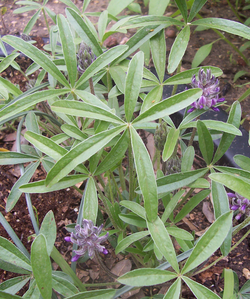Biology:Pediomelum hypogaeum
From HandWiki
Short description: Species of legume
| Pediomelum hypogaeum | |
|---|---|

| |
| Scientific classification Error creating thumbnail: Unable to save thumbnail to destination
| |
| Kingdom: | Plantae |
| Clade: | Tracheophytes |
| Clade: | Angiosperms |
| Clade: | Eudicots |
| Clade: | Rosids |
| Order: | Fabales |
| Family: | Fabaceae |
| Subfamily: | Faboideae |
| Genus: | Pediomelum |
| Species: | P. hypogaeum
|
| Binomial name | |
| Pediomelum hypogaeum (Nutt.) Rydb.
| |
Pediomelum hypogaeum (also known as Psoralea hypogaea) is a perennial herb also known as the little Indian breadroot or subterranean Indian breadroot. It is found on the black soil prairies in Texas .
Growth
It has an inflorescence on stems 5-6 centimeters long, separate from the leaves, arising from a subterranean stem and deep carrot-shaped root that is 3–7 cm long. The long petioled leaves are palmately divided into 5 linear-elliptic leaflets that are 3-5 centimeters long. The flowers, borne in condensed spikes separate from the leaves, are purple and pea-like, and have a surprisingly strong scent, reminiscent of lemon furniture polish. The species has edible tuberous roots, high in protein.
References
- Delena Tull (1987), Edible and Useful Plants of Texas and the Southwest, pgs 86-87
External links
- United States Department of Agriculture Natural Resources Conservation Service. PLANTS Profile: Pediomelum hypogaeum...subterranean Indian breadroot
- Texas A&M Bioinformatics Working Group. Texas Endemics: Distribution of Pediomelum hypogaeum var. scaposum
Wikidata ☰ Q7159288 entry
 |

